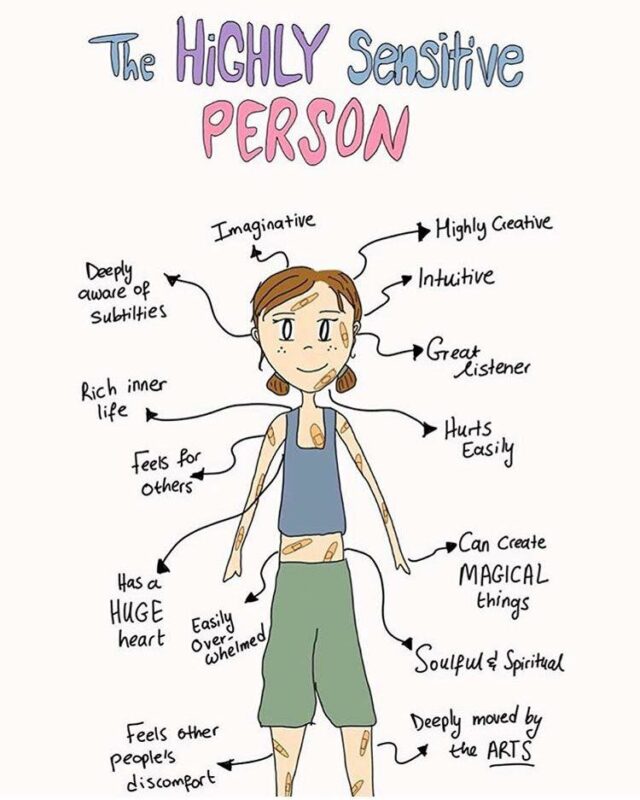
The Highly Sensitive Person
6th Jun 2019
Let’s face it rather than focusing on the usual stereotype connected with sensitivity, especially in a western culture that clearly seems to prefer confident, bold extroverts, it is important to highlight more and more that a highly sensitive person has so much to offer to themselves firstly, and to others and society in general. All too often a highly sensitive person may be seen as having negative tendencies, when in fact, as in most things, there are both strengths and weaknesses; they need to feel confident enough to contribute their unique gift to society.
Sensory Processing Sensitivity is also known as vantage sensitivity, high responsivity, and most commonly high sensitivity; Carl Jung is credited with firstly observing the trait in 1913, but it wasn’t until the first research by Dr. Elaine Aron and her husband was carried out leading to the publication of the bestselling book “The Highly Sensitive Person” in 1999, that the door opened for acceptance of the existence of high sensitivity into the psychology mainstream.
So what is high sensitivity?
It is a genetically inherited trait, also found in over 100 species of animal, present in males and females in equal measure, both introverts and extroverts (roughly 70% / 30%) where a highly developed nervous system operates, resulting in deeper processing and more intense feelings, both good and bad. More recent research has proven that different processes take place inside the brain of a highly sensitive person than a non-sensitive person, subjected to the same stimuli. And being a trait, it is not an illness, a diagnosis, there is no “cure”, and it won’t be found listed in DSM V.
Dr. Elaine Aron identified four key areas that would be present in a highly sensitive person under the heading DOES:
D Depth of processing – this manifests as depth of thought or feeling and may well affect speed of response because of this – Dr. Aron coined the phrase “pause to check” and this is particularly evident in highly sensitive children. As an adult, a person might contemplate the meaning of life or other deep topics such as what is happening to the environment. They are likely to come up with fantastic ideas when applying themself and these may include unusual insights.
O Overarousability – this may show as fussiness as a child and in adults as chronic stress and having difficulty with change. The need for more sleep than others would be apparent due to the amount of thoughts, feelings, general information being processed.
E Emotional Intensity – this applies equally to positive and negative emotions; a highly sensitive person may cry more easily, through sadness or joy, and conversely laugh out loud at something silly or even more subtle. Empathy is present as is a highly developed sense of fairness and justice. A highly sensitive person may also be very aware of the emotions and moods of others.
S Sensory Sensitivity – this would have been present as a child and continued to adulthood, though the position on the sensory spectrum may have evolved; noise, taste, light/dark, touch, smell, can all be prevalent. A highly sensitive person will normally notice the tiny details others may miss; subtle changes to a room; a ticking clock or dripping tap.

Some simple aspects to consider when looking at defining high sensitivity:
- Are you easily overwhelmed by such things as lighting – too light or dark, strong smells, coarse fabrics, or emergency services’ sirens?
- Do you get knocked off balance when having to do many tasks in a short time?
- Do you make a point of avoiding violent films and TV programmes?
- Do you make it a high priority to arrange your life to avoid upsetting or overwhelming situations?
- Do you notice or enjoy delicate or fine scents, tastes, sounds, or works of art?
- Do you have a rich and complex inner life?
- As a child, were you seen as sensitive or shy by parents, caregivers and teachers?
Here are some links to more complete questionnaires on Dr. Aron’s site :
https://hsperson.com/test/highly-sensitive-test/
https://hsperson.com/test/highly-sensitive-child-test/
Many famous people have shown highly sensitive traits and some openly acknowledge this (Alanis Morissette ) and given the creative side to the highly sensitive trait, perhaps it is no surprise many are in the arts.
There has been much research in recent years to further the information on High Sensitivity and yet still much is not known, including exactly how the trait is inherited.
For me, this quote by Perl Buck from many years ago sums up high sensitivity perfectly:
“A human creature born abnormally, inhumanely sensitive. To him…a touch is a blow, a sound is a noise, a misfortune a tragedy, a joy is an ecstasy
–
This is a Guest Post by David Wilson.
David Wilson is a BACP registered counsellor working out of Brighter Spaces in Islington, and has a studio in Stroud, Gloucestershire and also works worldwide online.
